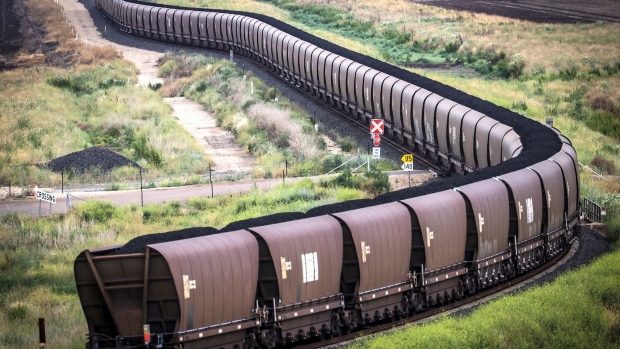Oct 6, 2022
Climate Systems ‘Breakdown’ Looms as Coal Investments Soar
, Bloomberg News

(Bloomberg) -- The coal industry has backtracked on pledges to phase out existing plants and halt new investments, putting the planet on a trajectory that could lead to a “breakdown of our climate systems,” according to a study led by nonprofit Urgewald.
As warnings from climate scientists “become more and more dire,” data revealing the actions of coal companies “remains depressingly consistent,” said Heffa Schuecking, director of Urgewald. Almost half the coal industry is expanding, with China leading the way, according to the analysis published Thursday.
Nonprofits aren’t the only ones warning of the devastating fallout from continued expansion of the dirtiest fossil fuel. Goldman Sachs Group Inc’s Michele Della Vigna, who heads the Wall Street bank’s natural resources research for EMEA, has dubbed the surge in coal finance a “massive setback” for the climate, and warns that Europe’s reliance on both coal and even diesel may stretch past this winter.
Scientists, meanwhile, have singled out coal, noting there’s no hope of limiting temperature increases to the critical threshold of 1.5C if the world continues to finance new projects. The UN Intergovernmental Panel on Climate Change says the world may be facing temperature increases of more than twice the 1.5C threshold, as emissions continue to rise. That would leave large swaths of the planet uninhabitable.
“The vast majority” of companies in the so-called Global Coal Exit List (GCEL) “still have no intention of retiring the coal assets, which are propelling us towards a breakdown of our climate systems,” Schueking said. “A real transition requires clear and near coal exit dates.”
GCEL, which is a survey of more than 1,000 coal companies, shows that 46% are still developing new coal assets. Only 56 companies -- equivalent to 5.3% of the total -- have announced a coal exit date. But even those setting deadlines have settled on dates that are “ridiculously late,” Urgewald said.
Much of that is related to the energy policies of the governments in which the companies operate, with China by far leading the way. “Coal is a global climate problem,” Nathaniel Bullard, a senior contributor to BloombergNEF and Bloomberg Green, said on Thursday. “Its expansion is also concentrated in a very few places.”
There’s also more cash from the finance industry flowing into coal, again led by Chinese banks. Reclaim Finance estimates that 190 banks and money managers still have no coal policy. A further 272 have either weak or inadequate policies, and only 28 have effective exit strategies.
In the first nine months of 2022, banks provided $26 billion in loans and bonds to the coal industry, up 36% from the same period in 2021, according to data compiled by Bloomberg. China Securities and China Everbright Bank are listed as the two largest coal bond underwriters.
Coal has undergone a resurgence this year as Russia’s invasion of Ukraine turbo charges all fossil-fuel markets. The International Energy Agency estimates that consumption of the dirtiest fuel will rise by 0.7% this year and then hit an all-time high in 2023.
A little under a year ago, governments left the COP26 climate summit in Scotland having pledged to cut their use of coal. They meet again next month for the COP27 climate summit in Egypt, with an energy crisis, war and the prospect of recession casting a huge shadow over talks.
Still, climate think tank E3G says that it’s not too late for coal companies to make good on their commitments to scale back. “We’ve seen an uptick in the number of coal power stations being kept online,” said Leo Roberts, research managers for E3G’s coal team. But that doesn’t undermine pledges made at COP26 last year, he said.
According to Shuecking, however, it’s clear that most of the coal industry is “not transitioning.”
It’s “either developing new coal projects or dragging out the life of existing coal assets,” she said. “Delaying has become a new form of climate denial.”
(Adds reference to governments in seventh paragraph)
©2022 Bloomberg L.P.






